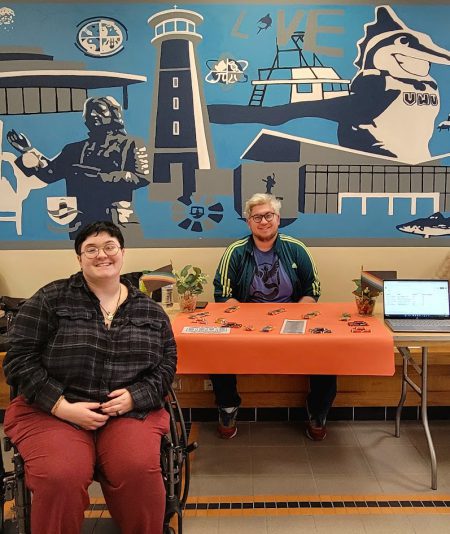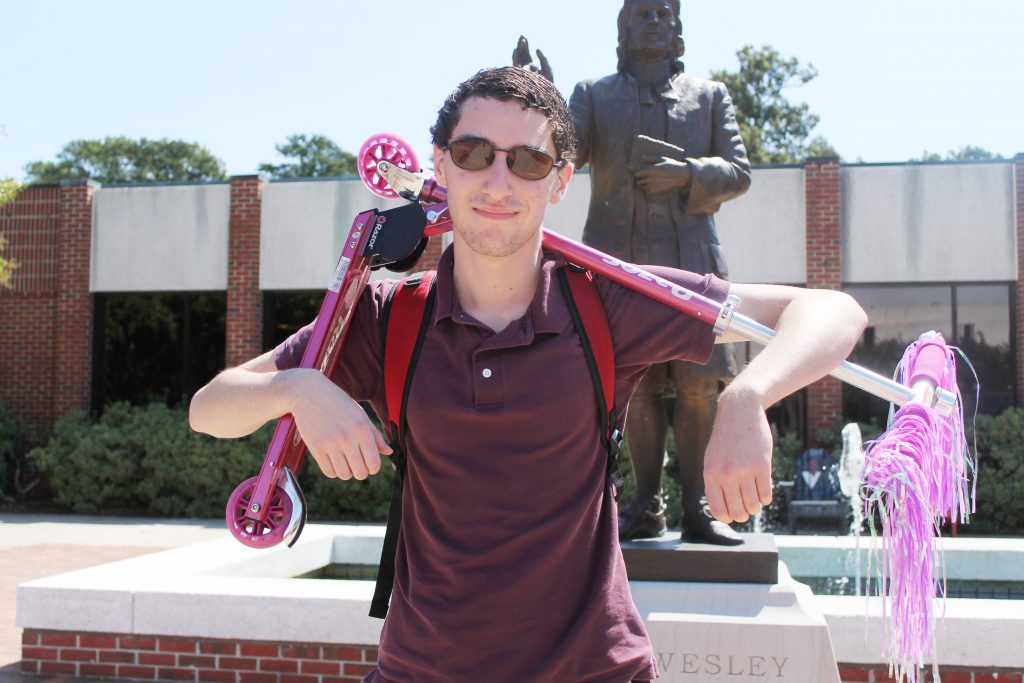Featured Image: Seniors Oliver Chauncey-Heine and Paul Nelson run the Student Involvement Fair DSU booth. Oliver Chauncey-Heine | Courtesy
The Disabled Student Union (DSU) is one of 40 student organizations at Virginia Wesleyan that fosters and cultivates community.
Having started the club in the spring semester of 2023, senior Oliver Chauncey-Heine, the founder and current president, has succeeded in making the DSU a communicative and open environment.
“We are a club designed to bring together disabled and nondisabled students to achieve accessibility, knowledge and allyship,” Chauncey-Heine said.
They expressed the purpose of wanting to create a space where all students could discuss issues, be seen and just hangout with each other regardless of having a disability or not.
Senior Paul Nelson, the current vice president, backed this up. He said the organization is “a coalition of students… coming together once every other week to talk about issues on campus and to create this community of acceptance and friendship.”
The meetings are not always the same, existing for the purpose of getting people together in whatever way is most comfortable and enjoyable for everyone. The members play games, talk and even do homework together sometimes.
Nelson expressed his excitement for their occasional PowerPoint nights.
“Once in a while, we have PowerPoints discussing some disabilities that might not be as recognizable, just so we’re more aware of the disabilities some students might have on campus,” Nelson said.
In describing the inspiration behind why they created the club, Chauncey-Heine said, “I myself am disabled, and I found that disabled students on campus do not have a voice. I know a lot of disabled issues aren’t talked about.”
Although Executive Director of Academic Support Services Crit Muniz does a great job helping students with their cognitive disabilities, the Learning Center exists primarily for the purpose of helping students succeed in their academics.
There is no employee representative on campus who advocates specifically for physically disabled students, and there is no one whose job is to ensure that campus is physically accessible for all.
“There are a lot of issues with problems like accessibility [on campus],” Nelson said. “And so I think looking at the next two or three years, we want to open up that pipeline and make it easier to voice issues around campus or with other organizations about communities and accessibility as a whole.”
A big step in making this happen can be found in senior Rachel Wilson’s research project for Honors Senior Seminar. Her goal is to create a plan with changes that Virginia Wesleyan can realistically implement to make the campus more physically accessible for its students.
Wilson praised Muniz for the work he does on campus and for his stepping up to additionally help students with physical disabilities.
“I believe our school has done a great job accommodating individuals with cognitive disabilities,” Wilson said. Her goal is to further address the effort the university as a whole needs to put forth when approaching accessibility.
“I am focusing on how to make housing, buildings and routes accessible throughout. I am taking into account the good things our campus does, but also some of the things we are lacking,” Wilson said.
She described her process of measuring and taking down percentages of different buildings, counting the pre-existing features Wesleyan has and talking with some of the DSU members about their personal experiences on campus.
Wilson expressed the importance of talking to people as a part of the research process.
“I feel like, as a recreational therapist [major], it’s not only about working with your participants but also advocating for them,” Wilson said.
She stressed that universities providing these kinds of building accommodations are important not just for their physically disabled students but also for injured athletes.
“I know several athletes that have needed wheelchairs, crutches or scooters to get around campus and have struggled because of the lack of ramps, elevators, the door lips on buildings and lack of push button doors,” Wilson said.
If injured athletes occasionally have to deal with the struggle of navigating the lack of accessibility aid on campus, then it is even more important to implement those changes to make it better for those students who have to face it every day.
In summation, the Disabled Student Union has been busy. Even with all of this happening, though, it is sticking to its original purpose of bringing students together.
The organization meets biweekly, and their next meeting will be Saturday, Oct. 7 at noon in Clarke 215. They welcome any and all people interested.
“We are just a community. We’re here for people to make more friends and feel more connected,” Nelson said. “We obviously talk about issues and work through things to make it better. But we are friends, and we are a community. And we are going to be together.”
By Phoebe Cox
pecox@vwu.edu

